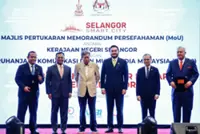PETALING JAYA: Online platforms, including social media and messaging services, should be made financially liable if they fail to screen anonymous users who then use their platforms to scam others, says an expert.
Malaysian Communications and Multimedia Commission (MCMC) member Derek Fernandez said this is because anonymity is a critical factor in online scams as perpetrators often use false identities, masked IP addresses or fake profiles to avoid being identified.
Already a subscriber? Log in
Save 30% OFF The Star Digital Access
Cancel anytime. Ad-free. Unlimited access with perks.





